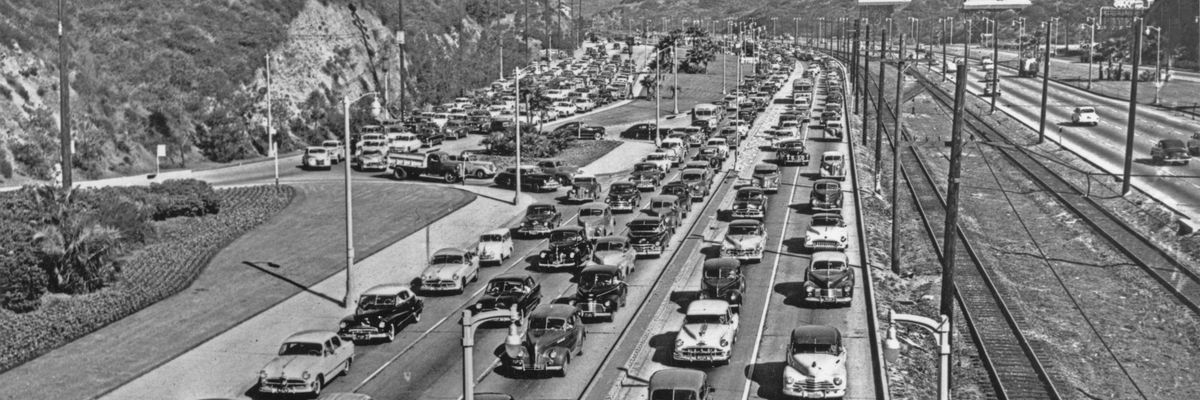Documents uncovered from several academic and news archives shed light on what one climate disinformation expert on Tuesday called "one of the earliest and most brazen efforts by the oil industry to prop up" a front group with the aim of denying climate science and delaying action that would cut into the industry's profits by protecting the planet from steadily increasing fossil fuel emissions.
The Climate Investigations Center found a warning that came in 1954 from the head of the Air Pollution Foundation, a group funded by the Western Oil and Gas Association. According to DeSmog, which reported on the findings, the lobbying group, now known as the Western States Petroleum Association (WSPA), poured $1.3 million into the APF in the 1950s—the equivalent of $14 million in today's dollars.
APF was set up with the public-facing intent of confronting the worsening smog crisis in Los Angeles, where the number of cars had doubled between 1940-50 and the area was rapidly industrializing.
But with funding coming from Western Oil and Gas Association members including Shell and companies that were later bought by ExxonMobil, Chervon, and other oil giants, the foundation was meant to be "protective" of the industry, as meeting minutes from 1955 showed.
At the time of APF's founding, researchers had begun warning that air pollution was caused by vehicles and refineries, and officials in Los Angeles had begun proposing new ordinances to cut down on smog.
To counter this, the foundation asked the California Institute of Technology (Caltech) to submit a proposal determining the main source of air pollution. Caltech geochemistry professor Samuel Epstein submitted a proposal in November 1954, warning that the Earth's climate could be affected by burning fossil fuels.
The "concentration of CO2 in the atmosphere" was a matter "of well recognized importance to our civilization," wrote Epstein.
After the report was submitted, APF president Lauren Hitchcock, a chemical engineer who had been recruited to lead the group, began investigating oil and gas refineries and publicly demanding pollution controls across California—actions that didn't please the industry giants who were backing APF.
As DeSmog reported, leaders of the Western Oil and Gas Association "summoned Hitchcock to the California Club where they reprimanded him, spelling out in no uncertain terms exactly what they expected in return for their hefty financial contributions."
According to the report:
Over lunch, WSPA's oilmen criticized Hitchcock for supporting pollution controls across California, for drawing "attention" to refinery pollution, and for conducting "too broad a program" of research. Instead, they told him they had formed the Air Pollution Foundation to be "protective," that Hitchcock should serve as "the research director for the oil industry" and the foundation should publish "findings which would be accepted as unbiased" where the oil industry's findings were not seen as trustworthy. This frank exchange, reported in detail by Hitchcock in a never-before-seen memo, unmasks the strategic motivations behind Big Oil's sponsorship of air pollution research.
Hitchcock resigned from APF in 1956, after many of the group's research projects were scaled back and the organization took the official stance in reports that carbon dioxide emissions were "innocuous."
"This is where Big Oil's climate disinformation began," said Aimee Dewing, a communications strategist focusing on environmental justice.
APF and the intervention from its funders "helped lay the strategic and organizational groundwork for Big Oil's decades of climate denial and delay," Geoffrey Supran, a climate disinformation expert at the University of Miami, told The Guardian.
"The fossil fuel industry is often seen as having followed in the footsteps of the tobacco industry's playbook for denying science and blocking regulation," added Supran. "But these documents suggest that Big Oil has been running public affairs campaigns to downplay the dangers of its products just as long as Big Tobacco, starting with air pollution in the early-to-mid-1950s."
DeSmog's report comes nearly two years after Shell and ExxonMobil were revealed to have known about the impact of fossil fuels on the climate earlier than previously reported.




